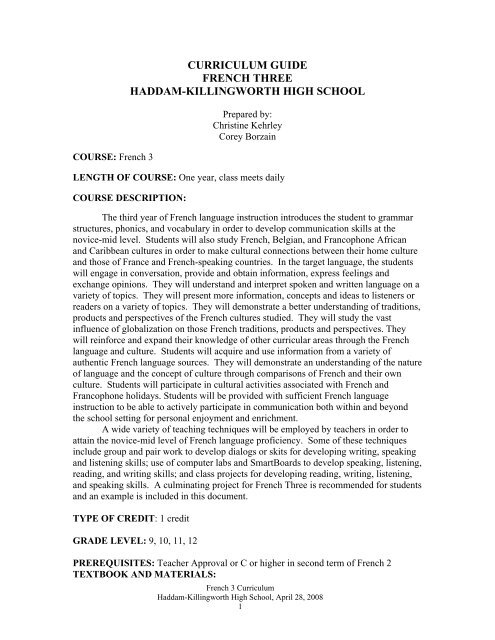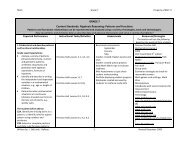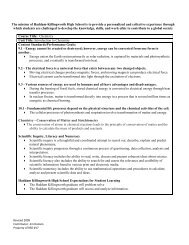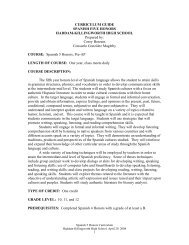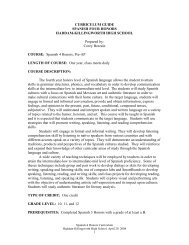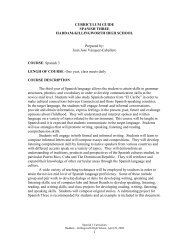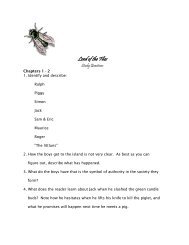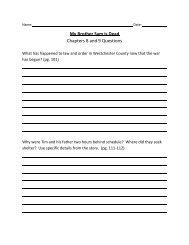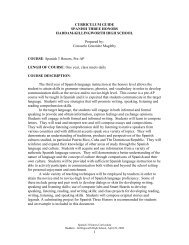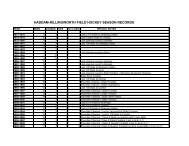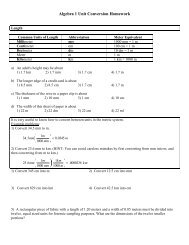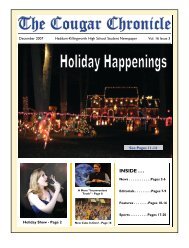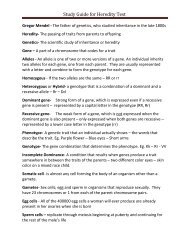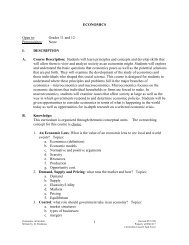French 3 Curriculum 04 28 08
French 3 Curriculum 04 28 08
French 3 Curriculum 04 28 08
- No tags were found...
You also want an ePaper? Increase the reach of your titles
YUMPU automatically turns print PDFs into web optimized ePapers that Google loves.
COURSE: <strong>French</strong> 3CURRICULUM GUIDEFRENCH THREEHADDAM-KILLINGWORTH HIGH SCHOOLPrepared by:Christine KehrleyCorey BorzainLENGTH OF COURSE: One year, class meets dailyCOURSE DESCRIPTION:The third year of <strong>French</strong> language instruction introduces the student to grammarstructures, phonics, and vocabulary in order to develop communication skills at thenovice-mid level. Students will also study <strong>French</strong>, Belgian, and Francophone Africanand Caribbean cultures in order to make cultural connections between their home cultureand those of France and <strong>French</strong>-speaking countries. In the target language, the studentswill engage in conversation, provide and obtain information, express feelings andexchange opinions. They will understand and interpret spoken and written language on avariety of topics. They will present more information, concepts and ideas to listeners orreaders on a variety of topics. They will demonstrate a better understanding of traditions,products and perspectives of the <strong>French</strong> cultures studied. They will study the vastinfluence of globalization on those <strong>French</strong> traditions, products and perspectives. Theywill reinforce and expand their knowledge of other curricular areas through the <strong>French</strong>language and culture. Students will acquire and use information from a variety ofauthentic <strong>French</strong> language sources. They will demonstrate an understanding of the natureof language and the concept of culture through comparisons of <strong>French</strong> and their ownculture. Students will participate in cultural activities associated with <strong>French</strong> andFrancophone holidays. Students will be provided with sufficient <strong>French</strong> languageinstruction to be able to actively participate in communication both within and beyondthe school setting for personal enjoyment and enrichment.A wide variety of teaching techniques will be employed by teachers in order toattain the novice-mid level of <strong>French</strong> language proficiency. Some of these techniquesinclude group and pair work to develop dialogs or skits for developing writing, speakingand listening skills; use of computer labs and SmartBoards to develop speaking, listening,reading, and writing skills; and class projects for developing reading, writing, listening,and speaking skills. A culminating project for <strong>French</strong> Three is recommended for studentsand an example is included in this document.TYPE OF CREDIT: 1 creditGRADE LEVEL: 9, 10, 11, 12PREREQUISITES: Teacher Approval or C or higher in second term of <strong>French</strong> 2TEXTBOOK AND MATERIALS:<strong>French</strong> 3 <strong>Curriculum</strong>Haddam-Killingworth High School, April <strong>28</strong>, 20<strong>08</strong>1
BOOKS:Discovering <strong>French</strong> Nouveau! Blanc 2, McDougal LittellDiscovering <strong>French</strong> Nouveau! Blanc 2 eEdition CD-ROM, McDougal LittellSelected readings from: Images Un, McDougal LittellJoie de lire, Level 1, Holt, Rinehart and WinstonANCILLARY MATERIALS:Teacher prepared materialsDiscovering <strong>French</strong> Nouveau! Blanc 2, Workbook, McDougal LittellDiscovering <strong>French</strong> Nouveau! Blanc 2, Activités pour tous Workbook, McDougal LittellDiscovering <strong>French</strong> Nouveau! Blanc 2,Take-Home Tutor CD, McDougal LittellDiscovering <strong>French</strong> Nouveau! Blanc 2, Overhead Transparencies and Copymasters,McDougal LittellDiscovering <strong>French</strong> Nouveau! Blanc 2 Teacher Unit Resource Books (8 volumes)Discovering <strong>French</strong> Nouveau! Blanc 2, McDougal LittellDiscovering <strong>French</strong> Nouveau! Blanc 2 Test Generator, McDougal LittellDiscovering <strong>French</strong> Nouveau! Blanc 2 Teacher to Teacher Copymasters, McDougalLittellDiscovering <strong>French</strong> Nouveau! Blanc 2 Power Presentations CD, McDougal LittellDiscovering <strong>French</strong> Nouveau! Blanc 2 EasyPlanner CD-ROM, McDougal LittellMcDougal Littell website with interactive activities for students and teacher resources:www.classzone.comCollins <strong>French</strong> Concise Dictionary, Harper Collins PublishersAuthentic online resources (including www.allocine.fr, www.voyages-sncf.com)<strong>French</strong> realiaRelevant maps in classroomAUDIOVISUAL MATERIALS:Discovering <strong>French</strong> Nouveau! Blanc 2 Integrated DVD and VHS Video Programs,McDougal LittellDiscovering <strong>French</strong> Nouveau! Blanc 2 Audio Program, McDougal LittellDepartment-owned culture-related videos, as appropriate.Use of podcasts where availableState of Connecticut Content Standards:<strong>French</strong> 3 <strong>Curriculum</strong>Haddam-Killingworth High School, April <strong>28</strong>, 20<strong>08</strong>2
In at least one language other than English, students will engage in conversation andcorrespondence, provide and obtain information, express feelings and exchange opinions.In at least one language other than English, students will understand and interpret spokenand written language on a variety of topics.In at least one language other than English, students will present information, conceptsand ideas to listeners or readers on a variety of topics.In at least one language other than English, students will demonstrate an understanding ofthe traditions, products, practices and perspective of the cultures studied, and will usetheir cultural knowledge for interpersonal, interpretative and presentationalcommunication.In at least one language other than English, students will reinforce and expand theirknowledge of other areas of study through the world language, and vice versa.In at least one language other than English, students will acquire and use informationfrom a variety of sources only available in the world language.In at least one language other than English, students will demonstrate literacy and anunderstanding of the nature of language through comparison across languages.In at least one language other than English, students will demonstrate an understanding ofthe concept of culture through comparisons across cultures.In at least one language other than English, students will use the world language and theircultural knowledge both within and beyond the school setting for personal enjoyment,enrichment and active participation.Enduring Understandings:<strong>French</strong> 3 <strong>Curriculum</strong>Haddam-Killingworth High School, April <strong>28</strong>, 20<strong>08</strong>3
Communicating with other people in their language facilitates the building of rapport.Communicating in another language facilitates participation in global economies.Gaining awareness and understanding of other cultures allows one to make connectionsbetween one’s own culture and those of other societies.Culture is reflected in the products, practices and perspectives of a society.Societies are enriched by the variety of cultures that exist within them.Gaining knowledge about and empathizing with other peoples and cultures leads to amore tolerant society.Essential Questions:How does <strong>French</strong> culture reflect <strong>French</strong> cinema and its characteristics and taboos?How do <strong>French</strong> attitudes toward health and exercise differ from American attitudes?How do fables and folktales reflect the different Francophone cultures where theydeveloped?How do I plan and prepare for a trip to a francophone country?ASSESSMENTS:<strong>French</strong> 3 <strong>Curriculum</strong>Haddam-Killingworth High School, April <strong>28</strong>, 20<strong>08</strong>4
Formative Assessments:Daily oral participationHomework and brief writings related to lessonsFormal and informal oral and written assessments through teacher generated questions,paired and small group activitiesJournal entriesSimulated language laboratory activitiesOral, aural, and written quizzesSummative Assessments:TestsPerformance assessmentsUnit 1: Free Time and Entertainment<strong>French</strong> 3 <strong>Curriculum</strong>Haddam-Killingworth High School, April <strong>28</strong>, 20<strong>08</strong>5
Topical Questions:What kind of entertainment do <strong>French</strong> teenagers enjoy watching?How does <strong>French</strong> cinema differ from that of the United States?What is important and what is taboo in <strong>French</strong> cinema and how does this compare to thecinema of the United States?How do I find and interpret a movie schedule on a <strong>French</strong> movie web site?How do I ask for and give information about a movie showing at a <strong>French</strong> cinema?How do I ask for and give my opinion about a movie?How do I invite someone to go out with me?How do I politely accept or refuse an invitation?How do I express my familiarity with people and places?How do I talk about what I am reading, writing or saying?What is Belgium famous for?What languages are spoken in Belgium?How do Belgian and <strong>French</strong> comic strips reflect the culture of their country of origin?How do I ask for and give my opinion of a comic strip?What is the role of the European Union in Francophone countries such as France andBelgium?How do I express myself using direct and indirect object pronouns?Key Knowledge and Skills:Students will:• Recycle previously acquired vocabulary and grammar• Learn vocabulary associated with entertainment• Invite friends to go out with them• Politely accept or refuse invitations• Conjugate the verb connaître• Use direct object pronouns with the present tense, with verb + infinitiveconstruction and with the passé composé• Conjugate the verbs dire, lire and écrire<strong>French</strong> 3 <strong>Curriculum</strong>Haddam-Killingworth High School, April <strong>28</strong>, 20<strong>08</strong>6
• Express things that they can read, write and say• Learn which verbs are followed by a direct object, which are followed by anindirect object and which are followed by both• Learn the use of indirect object pronouns• Differentiate the use of direct and indirect object pronouns• Research movies showing at <strong>French</strong> cinemas on an on-line <strong>French</strong> moviescheduleAssessments:• Skit: On an authentic <strong>French</strong> web site, students will look up and select a movieplaying at a <strong>French</strong> movie theater. Each student will invite his or her partner. Thepartner will ask questions about the movie to make a decision. The pair willsimulate purchasing tickets and will then go to a “café” in order to discuss theiropinion o the movie. They will also write answers to questions about the moviethey selected and their reaction to the film.• Quizzes and writing assignments• TestPerformance Assessment: After watching a <strong>French</strong> movie, students will write a moviereview. They will include basic information, such as the actors’ and director’s names, thesetting, descriptions of the main characters. They will also summarize the story and writea detailed opinion of the movie, giving examples from the movie to support their opinion.Unit 2: Folktales, Fables and CultureTopical Questions:How do I describe what I used to be like when I was little?How do I describe what I used to do when I was little?How do I talk and write about past events?How do I tell a fairy tale?How do African fables reflect the country where they originated?What are the parts of the body?<strong>French</strong> 3 <strong>Curriculum</strong>Haddam-Killingworth High School, April <strong>28</strong>, 20<strong>08</strong>7
How do I invent a monster and tell a story about him?What do <strong>French</strong> fables and African and Caribbean folktales tell me about the cultures wherethey developed?How do I narrate continuous past actions and repeated past actions?Are the folktales identical in each African country?How do the <strong>French</strong> fables and African and Caribbean folktales compare to the Americanfables, folktales and legends?Key Knowledge and Skills:Students will:• Learn new vocabulary of body parts• Learn new vocabulary of time expressions referring to the past• Form the imperfect tense• Recycle the formation of the passé composé• Differentiate the use of the imperfect and passé composé tenses• Conjugate the verb vivre in the present and past tenses• Form the imperfect tense (l’imparfait)• Narrate repeated past actions and continuous past actions using the imperfecttense• Distinguish between the passé composé and the imparfait• Read and respond to questions about folktales and fables• Apply vocabulary to write using the imperfectAssessments:• Skit: Two students will prepare questions and then perform an interview wherethey discuss what each one was like when he or she was little and what he or sheused to do. The conversation will be primarily in the imperfect tense.• Quizzes and writing assignments (write about what you used to be like and whatyou used to do when you were little)• Test<strong>French</strong> 3 <strong>Curriculum</strong>Haddam-Killingworth High School, April <strong>28</strong>, 20<strong>08</strong>8
How do vacations for the <strong>French</strong> differ from those of Americans?Where do <strong>French</strong> teenagers go during their vacations?Which modes of transportation do <strong>French</strong> teenagers prefer when traveling?How does traveling in France differ from traveling in the United States?How do I plan a camping trip in France?How do I describe my vacation plans?How do I travel by train or by plane?How do I find <strong>French</strong> train schedules on line?How do I plan a train trip in France?What are many countries of the world called?How do I describe what I will do in the future?How do I say what I will do if or when certain conditions are met?Key Knowledge and Skills:Students will:• Recycle previously learned vocabulary• Describe vacation plans• Plan a trip, including how to get there• Research <strong>French</strong> train schedules on an authentic <strong>French</strong> website• Name countries in the world• Use the future tense to describe what they will do• Discuss what will happen if certain conditions are met using the construction: Si +present Future• Discuss what will happen when certain conditions are met using the construction:Quand + future future• Use vocabulary associated with vacation and travel• Learn vocabulary associated with camping• Learn geographical terms and names of various countries in <strong>French</strong>• Learn vocabulary associated with taking the train• Use appropriate prepositions with names of countries<strong>French</strong> 3 <strong>Curriculum</strong>Haddam-Killingworth High School, April <strong>28</strong>, 20<strong>08</strong>11
Assessments:• Skit: Imagining that they are <strong>French</strong> teenagers, students will plan a trip to aFrancophone country (France or elsewhere). They must take the train to get to theairport in Paris or elsewhere. They will look up the train schedule and prices online. They will then perform a skit where they purchase their tickets at a trainstation. As they are buying their tickets, they run into an old friend to whom theyexplain their vacation plans (in the future tense).• Quizzes and writing assignments• TestPerformance Assessment: Students will write a composition describing the trip that theyplanned for their skit. They will write in the future tense and will describe when they willgo and with whom, how they will get there and what they will do while they are at theirdestination. Their plans while there must reflect an understanding of the local culture andhistory of their destination.Performance Task:<strong>French</strong> 3Year end Summative Performance Assessment<strong>French</strong> 3 <strong>Curriculum</strong>Haddam-Killingworth High School, April <strong>28</strong>, 20<strong>08</strong>12
The following is a sample authentic task (based on the model used in The Understandingby Design Handbook) that will help assess achievement of student goals for <strong>French</strong> YearThree.The culminating project or performance task for this year is for you to give a five minuteformal presentation of a story with visual aids.Goal: Your task is to choose a story you would enjoy retelling. Prepare visuals to helpyou remember the story and move the story along. Your story should feature the present,the future, and both past tenses. Where possible try to feature vocabulary from this year.Prepare a vocabulary list of “must know” words for your listeners. You will bedeveloping this project at home and in class. You may want to shorten a story forpresentation purposes. Please consult with your teacher, as you do this.Role: You are a Professional Storyteller.Product or Performance: The presentation should last five minutes. The transcript willbe prepared on a computer, be double-spaced and have all diacritical marks made on thecomputer. It should include at least all of the information cited above.Standards for Success:Your presentation and written work must meet the following standards:Presentation must be audible and of good quality (pronunciation, fluidity)Be at least five minutes in lengthInclude the information outlined aboveScript must be typed with all diacritical marks and double-spacedVisuals must be large enough for the audience and of good quality<strong>French</strong> 3 <strong>Curriculum</strong>Haddam-Killingworth High School, April <strong>28</strong>, 20<strong>08</strong>13


